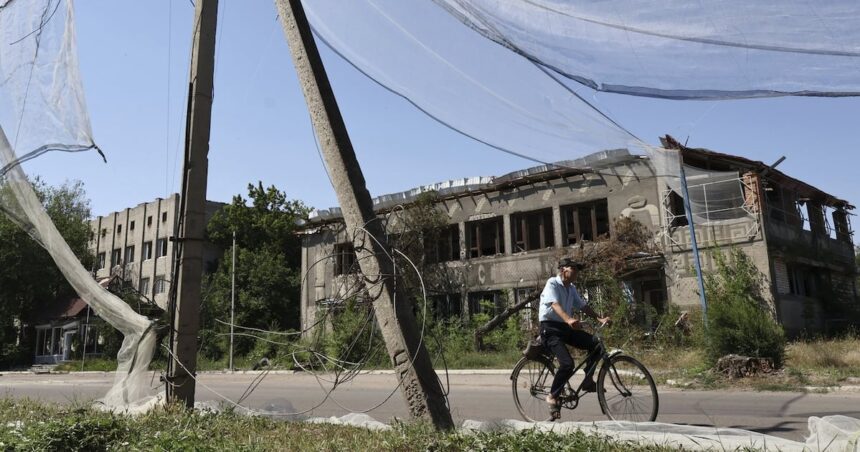As tensions escalate across eastern Ukraine, yesterday’s barrage of Russian missile and drone strikes marked one of the most intense bombardments in recent months. Standing amid the wreckage of what was once a six-story apartment building in Kharkiv, I watched emergency workers pull survivors from concrete debris that still smoldered in the morning light.
“This is the third time our neighborhood has been hit since April,” said Oleksandr Kovalenko, a 63-year-old former engineer whose face was streaked with dust. “But we have nowhere else to go.”
The timing of these attacks appears strategically calculated, coming just days before a U.S.-imposed deadline for progress on peace negotiations. According to Ukrainian military intelligence, Russia launched over 40 missiles and 60 Shahed drones across multiple regions, targeting energy infrastructure and civilian areas alike.
In Kyiv, the pre-dawn air raid sirens have become routine, but residents I spoke with described yesterday’s assault as particularly terrifying. “We could hear the interceptions happening right above us,” said Natalia Berezhna, a mother of two who spent seven hours in her building’s basement shelter. “The explosions were much closer than usual.”
The Pentagon reported that this escalation follows a clear pattern of Russian pressure tactics ahead of diplomatic milestones. “We’re seeing Moscow attempt to strengthen its negotiating position through force,” said U.S. Defense Department spokesperson Brigadier General Pat Ryder during yesterday’s press briefing.
Ukrainian President Volodymyr Zelenskyy addressed the nation last night, calling the attacks “a message written in blood” ahead of peace talks. His administration confirmed that seven civilians were killed nationwide, with dozens more injured. The Ukrainian Air Force claimed to have intercepted 29 missiles and 40 drones, but acknowledged that significant damage occurred despite these efforts.
What makes this moment particularly precarious is the approaching deadline set by Washington. Last month, U.S. Secretary of State Antony Blinken announced that substantial progress toward a ceasefire must be demonstrated by May 31st or certain categories of military assistance could face delays. This deadline has created palpable anxiety among Ukrainian officials and civilians alike.
“The Russians understand timing perfectly,” explained Dr. Hanna Shelest, Director of Security Programs at the Ukrainian Prism Foreign Policy Council, whom I interviewed via secure video call. “They’re testing not just Ukraine’s defenses but Western resolve. Creating humanitarian crises before negotiations is straight from their Syria playbook.”
The human cost of this strategy was evident in Dnipro, where I visited a hospital receiving casualties from the attacks. Dr. Mykhailo Orest, chief of emergency services, showed me wards filled beyond capacity. “We’re treating everything from blast injuries to trauma from collapsed buildings,” he said. “Twenty percent of our patients are children.”
Economic data from the Ukrainian Finance Ministry reveals the cumulative impact of these assaults: energy infrastructure damage has reached approximately $11 billion since the war began, with yesterday’s strikes adding an estimated $440 million to that figure. Three major power stations were hit, causing rolling blackouts across five regions.
Despite these pressures, Ukraine’s negotiating team maintains its core positions. Foreign Minister Dmytro Kuleba reiterated yesterday that territorial concessions remain off the table. “Peace cannot come at the cost of sovereignty,” he stated during a press conference I attended in Kyiv.
The Kremlin, meanwhile, continues to frame its conditions through state media. Spokesman Dmitry Peskov told TASS news agency that Russia’s “special military operation” will continue until its objectives are met, regardless of artificial deadlines.
For ordinary Ukrainians caught in this deadly diplomatic dance, the outlook is increasingly bleak. In a community center converted to a shelter in Zaporizhzhia, I met families who had fled villages near the front lines. “We don’t care about deadlines or politics anymore,” said Iryna Bondarenko, holding her infant grandson. “We just want to stop running.”
The humanitarian situation threatens to worsen as summer approaches. The World Food Programme warned yesterday that 3.6 million Ukrainians now face food insecurity, a number that could rise by 20% if power outages affect refrigeration and water pumping systems during warmer months.
Military analysts suggest that Russia may be planning a larger offensive to coincide with the deadline’s expiration. “The current attacks appear designed to degrade Ukraine’s air defenses and exhaust interceptor stocks,” said Colonel Maksym Shaptala of Ukraine’s Armed Forces, who briefed reporters yesterday at a secure location outside Kyiv.
As night falls again over Ukraine, air raid alerts continue their ominous wail. Somewhere between the high politics of Washington, Brussels and Moscow, millions of people will once again seek shelter underground, wondering if peace remains possible or if deadlines will simply mark new chapters in an enduring tragedy.
What happens after May 31st remains uncertain. But for those living under bombardment, the only deadline that matters is surviving until tomorrow.






